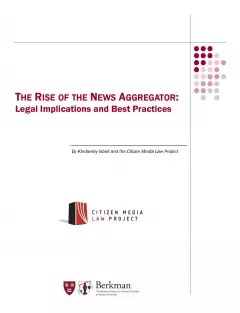
The Rise of the News Aggregator: Legal Implications and Best Practices
During the past decade, the Internet has become an important news source for the majority of Americans. According to a study conducted by the Pew Internet and American Life Project, as of January 2010, nearly 61% of Americans got at least some of their news online in a typical day. This increased reliance on the Internet as a source of news has coincided with declining profits in the traditional media and the shuttering of newsrooms in communities across the country. Some commentators look at this confluence of events and assert that, in this case, correlation equals causation – the Internet is harming the news business.
One explanation for the decline of the traditional media that some, including News Corporation owner Rupert Murdoch and Associated Press Chairman Dean Singleton, have seized upon is the rise of the news aggregator. According to this theory, news aggregators from Google News to The Huffington Post are free-riding, reselling and profiting from the factual information gathered by traditional media organizations at great cost. Murdoch has gone so far as to call Google’s aggregation and display of newspaper headlines and ledes “theft.” As the traditional media are quick to point out, the legality of a business model built around the monetization of third-party content isn’t merely an academic question – it’s big business. Revenues generated from online advertising totaled $23.4 billion in 2008 alone.
But for all of the heated rhetoric blaming news aggregators for the decline of journalism, many are still left asking the question: are news aggregators violating current law?
This white paper attempts to answer that question by examining the hot news misappropriation and copyright infringement claims that are often asserted against aggregators, and to provide news aggregators with some "best practices" for making use of third-party content.
You might also like
- communityPredictions for Journalism
